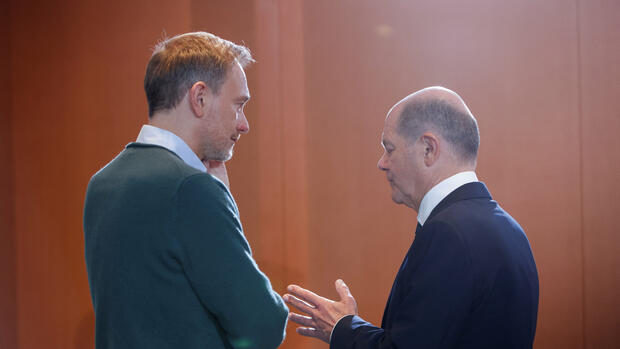The Federal Minister of Finance has been pursuing an austerity plan for a long time, and now Chancellor Scholz is to support a controversial plan presented by Lindner.
(Photo: Reuters)
Berlin The budget dispute in the traffic light coalition is intensifying. While Federal Finance Minister Christian Lindner and the FDP are calling on all ministries to save, the Greens are warning against excessive budget cuts. An agreement should be reached by early July.
According to internal calculations by the Ministry of Finance, there is currently a funding gap of 20 billion euros in the budget for the coming year. From the perspective of the liberals, the traffic light coalition must now put together an austerity package.
“Pointing the finger at the finance minister is inappropriate, everyone has to do their part,” said the deputy chairman of the FDP parliamentary group, Christoph Meyer. “It is clear that every ministry has to prioritize and consolidate.” The solution will be found together in the federal government.
The Ministry of Finance is said to already have very concrete ideas as to how the billion-dollar gap could be closed. Part of the solution could be across-the-board savings across all departments except defense.
Accordingly, they would save two to three percent of their expenses. However, only flexible expenditure such as support programs should be reduced. The exceptions would be social spending, which is required by law, and investments.
>> Read more: Tax revenues collapse by 150 billion euros
According to a report by the Bloomberg news agency, Chancellor Olaf Scholz (SPD) should support this plan. There was no confirmation of this in government circles. And yet the rumors are causing unrest in the coalition. While the FDP is satisfied that the chancellor can back the finance minister, the alarm bells are ringing among the Greens.
Greens are skeptical about Lindner’s savings plan
As a precaution, the chief budgetary of the Greens, Sven-Christian Kindler, points out that the SPD and FDP will not get very far without the approval of the Green ministers. “In the end, the entire cabinet and not just parts of it have to approve a draft budget,” said Kindler.
The Greens are skeptical about the plan to cut almost all ministries. “Breakdown cuts with the lawn mower and then with the exception of a single department would have been out of date and the opposite of a targeted, clever budgetary policy,” warned Kindler.
He pointed out that the defense budget had “grown rapidly” from 33 billion euros in 2015 to 50 billion euros, but without any noticeable improvements in the Bundeswehr’s performance.
The Greens are opposed to across-the-board cuts in government spending.
(Photo: IMAGO/Future Image)
The Greens fear that a cut of two to three percent could have much more serious consequences than the small number would suggest. With a total expenditure of around 420 billion euros, there would be savings of around ten billion euros. However, since only a good 40 billion euros are considered flexible, a reduction here would have a major impact.
Removing subsidies as a possible solution
“There are sensible alternatives to a blind austerity policy, which stalls the economic recovery and endangers social and democratic cohesion,” says Green Housekeeper Kindler. Instead, he proposes tax increases for the rich. However, that will not be possible with the FDP. Lindner has repeatedly ruled out tax increases.
A second proposal from Kindler, on the other hand, could be part of a solution. He calls for the “dismantling of climate-damaging subsidies”. When it comes to the question of which subsidies should be reduced exactly, there are big differences between the Greens and the FDP.
>> Read here: Lindner feels confirmed in the budget dispute by the IMF
Nevertheless, such cuts could be a compromise for the coalition, up to and including clever interest rate management. However, this should only result in a low single-digit billion amount.
This, together with the savings in the departments, could then help to close the gap. In the traffic light coalition, there are still hopes that the financial gap will ultimately be smaller than the 20 billion euros with which the Ministry of Finance is now starting the negotiations.
More: Federal government prepares austerity package
